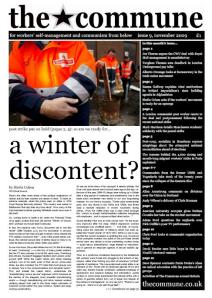Demonstrate outside Ferrexpo’s office in London on Friday 3rd September from 4:30pm at 2-4 King Street, SW1. Click here for flyer.
A major dispute is underway between mineworkers in Poltava in central Ukraine and Ferrexpo Plc, a major player on the global market mainly engaged in mining of iron ore. All three shifts in the open cast in the town of Komsomolsk, of more than 300 workers each are now involved in industrial action. Some railway locomotive drivers and workers on the iron ore concentrating factory have joined in solidarity.
The action started on 1st August at 10am when the workers at the ore-dressing open cast pit started at first with a go-slow and work-to-rule. The action began when haul trucks drivers on their way down to the 305 meter deep quarry reduce speed of the vehicles from normal 40-45 km/h to the more safe 10-15 km/h. Excavator and bulldozer operators, as well as drilling technicians then joined the action in solidarity. Within 24 hours of the workers’ action total rock production had fallen by less than 60% of normal volume. This impact of the workers resistance is continuing. Continue reading “demonstration this friday in solidarity with ukrainian miners”










